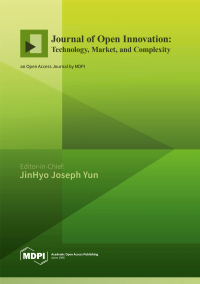Clusters, Geographies, Economies, Innovations
A special issue of Journal of Open Innovation: Technology, Market, and Complexity (ISSN 2199-8531).
Deadline for manuscript submissions: closed (1 January 2020) | Viewed by 14632
Special Issue Editor
Special Issue Information
Dear Colleagues,
This Special Issue focuses on economic geographies, clusters, and innovations. Suitable topics include, e.g., studies on economic geography, digitalization, urban development, clusters, and innovations. This themed issue welcomes article proposals that will provide insight into spatial formations of information, communication, technologies, and knowledge production from various perspectives including analyses of the public and private sectors, together with NGOs and other stakeholders. Potential papers may focus on theoretical developments or empirical analyses. The articles are targeted at the academic community, as well as practitioners, such as spatial developers, planners, and officers, in order to increase the understanding of the dynamics and factors effecting spatial economy (in particular, information regarding the challenges and obstacles that should be considered in decision making in cities or/and peripheral locations).
Suitable topics include but are not limited to:
- Integration of spatial analysis and knowledge-based theory
- Regional case studies of technology geographies
- Epistemological considerations of information- and knowledge-driven studies of spatial or regional development
- Spatial scaling of knowledge sources for economic growth
- Clusters of knowledge creation
- Urban–rural dichotomies and digitalization
- Case-based solutions for local knowledge economies
- Comparative studies of innovative growth
- Geographical differentiation of innovation and knowledge production between and within countries
- Local lessons of science/technology andinnovation initiatives
- Policy studies of technology
- Travelling theory, location context, and ICT
Prof. Dr. Tommi Inkinen
Guest Editor
Manuscript Submission Information
Manuscripts should be submitted online at www.mdpi.com by registering and logging in to this website. Once you are registered, click here to go to the submission form. Manuscripts can be submitted until the deadline. All submissions that pass pre-check are peer-reviewed. Accepted papers will be published continuously in the journal (as soon as accepted) and will be listed together on the special issue website. Research articles, review articles as well as short communications are invited. For planned papers, a title and short abstract (about 100 words) can be sent to the Editorial Office for announcement on this website.
Submitted manuscripts should not have been published previously, nor be under consideration for publication elsewhere (except conference proceedings papers). All manuscripts are thoroughly refereed through a single-blind peer-review process. A guide for authors and other relevant information for submission of manuscripts is available on the Instructions for Authors page. Journal of Open Innovation: Technology, Market, and Complexity is an international peer-reviewed open access quarterly journal published by MDPI.
Please visit the Instructions for Authors page before submitting a manuscript. The Article Processing Charge (APC) for publication in this open access journal is 800 CHF (Swiss Francs). Submitted papers should be well formatted and use good English. Authors may use MDPI's English editing service prior to publication or during author revisions.
Keywords
- Economic geography
- Clusters
- Innovative cities
- Economy
- Innovation
- Spatial development
Benefits of Publishing in a Special Issue
- Ease of navigation: Grouping papers by topic helps scholars navigate broad scope journals more efficiently.
- Greater discoverability: Special Issues support the reach and impact of scientific research. Articles in Special Issues are more discoverable and cited more frequently.
- Expansion of research network: Special Issues facilitate connections among authors, fostering scientific collaborations.
- External promotion: Articles in Special Issues are often promoted through the journal's social media, increasing their visibility.
- e-Book format: Special Issues with more than 10 articles can be published as dedicated e-books, ensuring wide and rapid dissemination.
Further information on MDPI's Special Issue polices can be found here.




